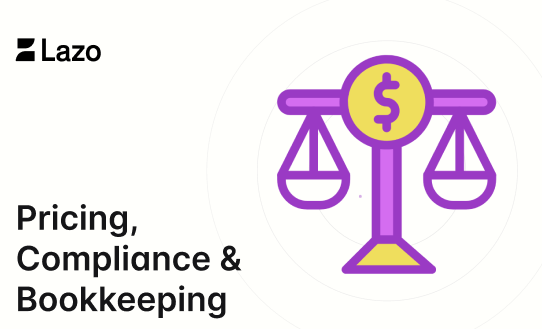Login to your Lazo One account here
Login
%20(1).jpg)
Expanding across state lines can be a growth milestone for startups—but it also brings tax complexity that many founders underestimate. Whether you're hiring remotely, serving customers in new regions, or opening a second office, your operations may trigger state-specific tax obligations you can’t afford to ignore.
Here’s how to manage taxes with a practical guide to stay compliant, minimize risk, and prepare your startup for long-term scale.
In the U.S., each state has its own tax laws—and most don’t follow federal rules exactly. That means you might owe sales tax in one state, income tax in another, and payroll taxes in several more. The concept of nexus is key:
if your startup has a “sufficient connection” to a state—through employees, customers, offices, or even remote work—you may be legally required to register and pay taxes there.
Failing to manage this properly can result in penalties, interest, and red flags during due diligence. As you plan how to manage taxes across states, clean, state-aware records are essential—professional bookkeeping makes that discipline scalable.
1. Identify Where You Have Nexus
Start with a detailed map of your startup’s activity (how to manage taxes starts here):
Some states also consider economic nexus: surpassing a certain number of transactions or dollar volume (often $100K+) can trigger obligations even without a physical footprint. 🧠 Tip: Don’t just think about where you’re based—think about where your business touches (crucial for how to manage taxes in a multi-state startup).
If you’re still structuring your entity or expanding operations, make sure your registration framework aligns with multi-state compliance — review your incorporation to ensure it supports growth across jurisdictions.
If you’ve identified nexus in a state, you’ll likely need to register with the Department of Revenue, obtain sales tax permits, set up withholding accounts, and file state income/franchise returns. Each state differs, and some impose business taxes simply for operating there.
If you’re unsure how to manage taxes setup across states (sales, payroll, franchise), lean on expert guidance through Taxes to map obligations by jurisdiction and avoid costly delays.
Multi-state compliance becomes hard to manage manually as your startup grows. For how to manage taxes at scale, you’ll need:
Integrating proper bookkeeping early on ensures all tax data syncs correctly across states — helping you file faster, minimize audit risk, and maintain clarity during fundraising rounds.

Compliance isn’t just about collecting taxes — it’s about filing the right forms and keeping audit-proof records. For each state, your startup may need to file monthly or quarterly sales tax returns, submit W-2s/1099s, document deductions/exemptions, and track apportionment for income taxes.
Some states are aggressive enforcers. Strong internal controls and professional accounting practices are essential. If you’re preparing for investor due diligence, keeping accurate filings will also strengthen your next fundraising round.
State taxes rules evolve constantly: nexus thresholds shift, taxable service definitions vary, and remote-work standards continue to change. Set a quarterly review to monitor key states where your startup operates and document every change in your internal reports.
Treat how to manage taxes as an ongoing process, not a one-time setup — it’s part of your operational infrastructure.
If you’re scaling rapidly, you can schedule a call with our experts to review your compliance systems, strengthen multi-state strategy, and ensure your startup remains audit-ready at every stage.
Managing taxes across multiple states isn’t just finance—it’s strategy. It proves your startup is operationally sound, ready for scale, and due-diligence-ready. Think of how to manage taxes as part of your core infrastructure: a foundation that lets you grow confidently, attract investors, and stay compliant as you expand nationwide.
Startups thrive on speed, but taxes demand foresight. If your startup operates in multiple states (or plans to), the moment to set up a scalable framework for how to manage taxes is now—not when an IRS notice arrives or you’re mid-due-diligence.
Clean, proactive compliance practices make your company more resilient, credible, and attractive to investors. If you’re ready to streamline how your startup handles multi-state taxes, consider scheduling a call to review your structure, explore pricing options, and join our upcoming webinars to strengthen your financial operations. More resources available anytime at Lazo.